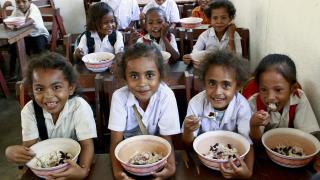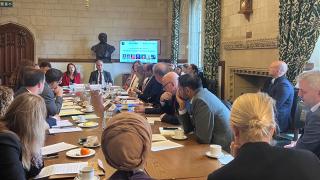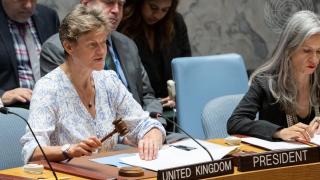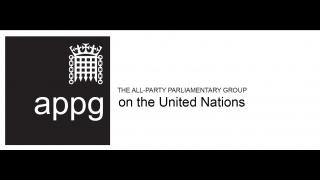
On 17 May, the All-Party Parliamentary Group on the UN hosted an event in the House of Lords entitled 'Have the UN Millennium Development Goals (MDGs) made a difference'?
Chaired by Natalie Samarasinghe, Head of Policy & Communications at UNA-UK, the event explored the successes and constraints of the MDG framework, with a view to gather UN, academic and NGO perspectives on how the international community might address poverty in a strategic manner after 2015 – the target date for achieving the Goals.
The event featured presentations by Professor David Hulme, Chronic Poverty Research Centre, University of Manchester, Alison Marshall, UNICEF UK, Caroline Hurford, UN World Food Programme, Phil Mulligan, UN Association of the UK.
{Details of presentations}
[Professor David Hulme, Brooks World Poverty Institute, University of Manchester]
David Hulme of the Brooks World Poverty Institute provided the academic perspective, arguing that the MDGs have helped reinforce the message that development is not just about economic growth but human development too. He praised the Goals for helping to coordinate aid efforts and focus the attention of the international community, but also outlined challenges posed by a framework that concentrates heavily on quantitative targets. An example he cited was the emphasis on primary-school enrolment at the expense of quality of education. He closed by calling for the post-2015 era to be one of 'voice' rather than 'measurement', noting the importance of inclusivity and local and national ownership of development targets.
[Caroline Hurford, UN World Food Programme in London]
Caroline Hurford focussed her remarks on MDG1 – halving the proportion of people living in poverty and hunger, which she described as the 'gateway goal'. She stressed the importance of this Goal to the achievement of all others. People who are unsure where their next meal will come from are unlikely to have time or strength to concentrate on anything else. In addition to individual hunger, malnutrition imposes a crushing economic burden on the developing world, with every child whose development is stunt standing to lose 5-10% in lifetime earnings. The progress made towards achieving Goal 1 had slowed as a result of soaring food prices and the economic downturn.
[Alison Marshall, UN Children's Fund (UNICEF-UK)]
Alison Marshall outlined the gains the MDGs have delivered for child survival, primary-school enrolment and HIV treatment, but argued that the data averages used to measure progress obscured the overall picture. Using a map of Brazil, she demonstrated that while national data indicated the country was on track to achieve MDG2 on primary education, progress was patchy at the local and district level, with many districts unlikely to meet the targets by 2015. She made a strong case for disaggregated data, and for pursuing an equity and rights-based approach to development post-2015. This, she argued, would help to ensure that the most vulnerable are not left behind.
[Phil Mulligan, UNA-UK Executive Director]
Phil Mulligan began his presentation by outlining the value of the MDGs in delivering concrete gains on the ground; providing a clear, focussed framework for programmes; and a rallying cry for civil society. The Goals do, however, have both design and delivery failures. The latter includes the failure to meet expectations that do not take into account factors external to the MDGs. The former are the inherent weaknesses in the MDG framework, such as the exclusion of certain groups and issues, the lack of national ownership of the Goals and the emphasis on aid and the lack of accountability to beneficiaries in developing countries. He argued that aid agencies, governments and civil society must begin thinking now about distilling the lessons learned from the past MDG decade into a more inclusive framework post-2015.






